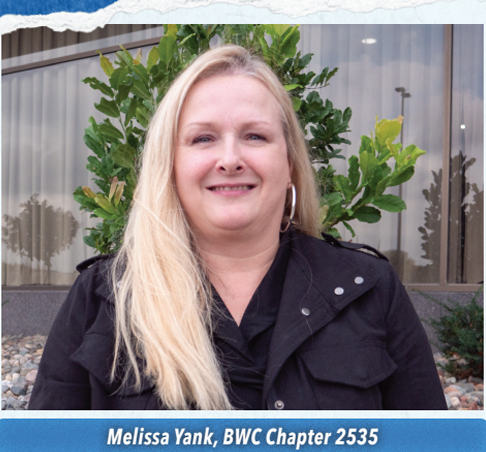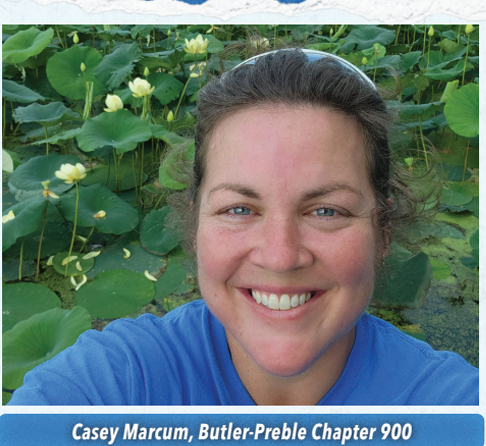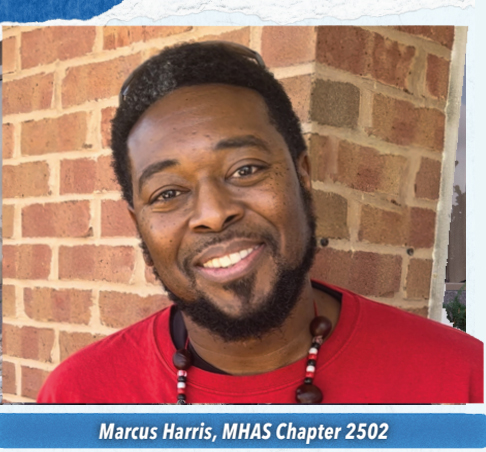The Fall edition of the OCSEA magazine, the Public Employee Quarterly, is here, and we're excited that members can read more about OCSEA activists who are making a difference because of the UNION DIFFERENCE. In Stories In Action: The Union Difference, three OCSEA members tell their stories of public service and union activism and how both have changed their lives for the better. Read the entire magazine at OCSEA.org/PEQ.

Melissa Yank’s union story starts when she was just five years
old. That’s when her mom got divorced and went in search
of a job to feed her three children, including Melissa, her
sister and her brother.
Melissa remembers hard times back then. “I can remember in those
early days, we sometimes had to skip a meal, even. The jobs my mom
got sometimes couldn’t even put food on the table,” she explained.
But all that changed when her mom went to work for the Bureau
of Workers Compensation. “Once my mom got a job with the State,
all that changed,” she said. “I remember there was a girl at my school
who didn’t have a coat, whose family couldn’t afford a coat. I was able
to give her mine because I knew we were now able to afford to buy
me a new one,” said Melissa, happily.
Once Melissa graduated high school, her Mom encouraged her to
apply for a job with BWC, too. She applied and came to work for
BWC back in 1990 as a Clerk 3. “That job changed my life. While it
wasn’t the highest paid job, now I was able to get a house, get married
and raise my children,” she said. “And it was all because of the union,”
she said.
Later, Melissa utilized OCSEA Workforce Development funds—
now called the Union Education Trust––to get a bachelor’s degree in
information technology.
Now, Melissa has a high-level job as a quality control IT software
specialist for BWC’s large-scale IT systems. She’s seen her children
grow, has sent them to college, afforded her family health care, all
because of her union job, she explains.
She’s also gone a long way in her union. While Melissa has been
involved in her union for many years, these days she’s the chapter president of one of OCSEA’s largest chapters, BWC Chapter
2535, and this year, she got elected to OCSEA’s Statewide Board of
Directors.

For Casey Marcum, working in the Ohio State Parks system is
like putting on a fuzzy hoodie. It’s comfy and warm. She was a
third generation Hueston Woods Park employee: both her uncle
and her mom worked there. “My great uncle was on the maintenance
staff. Then my mom worked at the golf course and helped at the park
in the wintertime,” she explained.
Casey says working at Hueston Woods State Park was her dream
job growing up. “My mom always told me about working there. I’ll
never forget when her best friend gave me a paper application and
they hired me right then and there. I was still in high school but
worked at the park for two hours a day after school,” she said. That’s
when her journey with state employment began. It was her first job
ever.
In the 19 years since she’s worked for the Ohio Department of
Natural Resources Parks and Watercraft Division, she’s held just about
every Parks job classification you can think of.
But through all those positions and job changes, Casey was always
only a permanent part-time employee. “It was always scary and
stressed me out every year because I had to get 1,560 hours (30 hours
per week) to get my health care,” she said of the years she struggled as
a part-time employee. Now those days are over.
In August of last year, after nearly 20 years as a permanent parttime employee, Casey applied for and got a full-time permanent position with the division. And it happened because of her determination,
grit and talent.
She explains getting her full-time job this way: “Mary Mertz, the
Director of ODNR, visited Hueston Woods and liked a renovation
of one of our restrooms. She asked who did it, and I looked down
at my own hands. I had completely renovated the restroom down to
the studs, and the director liked it. Then she asked me: ‘What is it
that the Parks need?’ And I said, ‘We need more full-time employees.’
Three months later I applied for and was offered a full-time Parks
position,” Casey beamed.
Now, Casey doesn’t know if the Director had a hand in that or if
it was just her own resolve to get a full-time position, but in any case,
last year Casey became the first full-time employee at the Little Miami
State Park.
She explains that the Park is basically a multi-use trail that runs
from Xenia to Terrace Park, which is past Milford Park. She also
works at Cowan State Park. “I do anything and everything. Mowing,
cutting brush off trails, cleaning out culverts and ditches, dealing with
electric and water issues, even interacting with people, like Friends of
the Parks volunteers and city and town officials,” she said.
Even though Casey was part-time for so long until last year, she
was always a member of the union. “I joined the union as soon as
I started. My dad works for the City of Fairfield and is a big union
guy,” she explained.
She’s currently seriously considering entering a leadership position
at her local chapter.

Marcus Harris grew up on the east side of Youngstown.
That’s where he learned about life and a work ethic as a
Therapeutic Program Worker with the Ohio Department of
Mental Health and Addiction Services.
Marcus was raised in a two-parent household, something for which
he says he’s lucky, in a generationally owned homestead. “My dad was
a hard worker and took good care of the home and land that once
belonged to my grandparents,” said Marcus. His dad worked in the
steel mills, first in Youngstown and then in Aliquippa, Pennsylvania.
Later, he found his way to working in plastics. That’s how Marcus
learned about the importance of unions and a hard days’ work.
“But my dad was always there,” said Marcus who talked about
how his dad chose to work third shift so he could be there for everything he did. Marcus was a high school scholar and track athlete at Youngstown’s East High School. He said his parents always made time
to encourage him and show up.
Thanks to that encouragement and work ethic, Marcus earned a
full-ride scholarship to The Ohio State University where he would
run varsity track and study sociology. While things didn’t go exactly as
planned after breaking his wrist and losing his scholarship for a year,
he worked hard and made his way back to the track team. During
his hiatus, he worked at the OSU Medical Center in several fields,
including neurology, psychology, and out-patient physical therapy
rehab.
After college, Marcus took his love of ministry and athletics and
went overseas to Prague in the Czech Republic. “I’m an athlete at
heart and wanted to help others,” said Marcus who worked closely
with university students on training, motivation and goals, and conversational English.
When Marcus made his way back to the U.S., he began his career
in the private sector putting his work ethic in action at a mail-order
pharmacy and a group home. But the pharmacy was bought out and
jobs were being cut right and left. That’s when he turned to public
service, for the security and stability he needed for his new and growing family.
In 2010, Marcus began his career with MHAS at Twin Valley
Behavioral Healthcare in Columbus. He started out on second shift
early on, but as his son got older, he was reminded of his dad and how
third shift permitted him to be an active participant in his life. He
wanted the same for his son. Third shift allowed him to coach soccer,
to help with conditioning and training, and to “show up” for his son
Mace—who is now 16—just like his dad and mom did for him.
“It’s hard work, but it’s rewarding,” said Marcus. “We’re going
into a fire every night. We do patient observations all night, suicide
watches, and there’s constant instability,” he said. “But we’re an
important part of making sure things run smoothly for the first shift
the next day.”
He says the revolving door of staff makes it harder. But that’s where
his “stick-to-itiveness” and union leadership skills come into play.
Marcus says he’s not timid about filing grievances and speaking up.
Marcus says the victories in his work come when he “never sees
a patient again” or he sees them in the community living a life of
recovery. “I saw a guy at Giant Eagle. We looked at each other, and
I nodded to say, ‘you doing good?’ That’s all that I needed to do,” he
said. Marcus says his facility is important for those people who suffer
a one-time psychotic break. Others need the stability of the state facility to live their lives, he said.
Marcus is proud of the work he does, and so is his family. His wife
of 17 years, Tracy, also serves the community with the Children’s
Hunger Alliance, and supports what he does for his community.